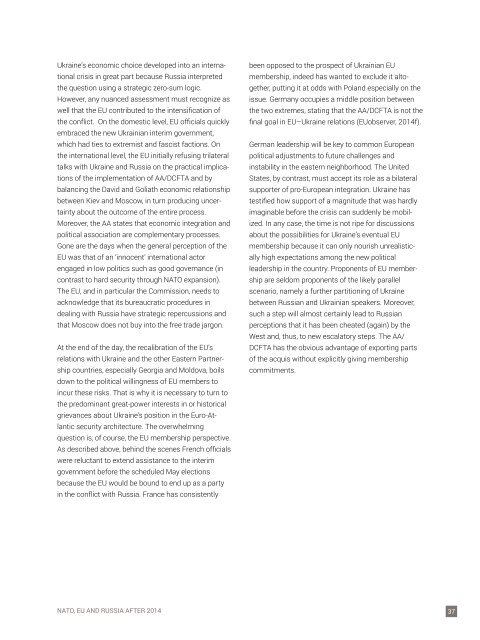Create successful ePaper yourself
Turn your PDF publications into a flip-book with our unique Google optimized e-Paper software.
Ukraine’s economic choice developed into an international<br />
crisis in great part because Russia interpreted<br />
the question using a strategic zero-sum logic.<br />
However, any nuanced assessment must recognize as<br />
well that the EU contributed to the intensification of<br />
the conflict. On the domestic level, EU officials quickly<br />
embraced the new Ukrainian interim government,<br />
which had ties to extremist and fascist factions. On<br />
the international level, the EU initially refusing trilateral<br />
talks with Ukraine and Russia on the practical implications<br />
of the implementation of AA/DCFTA and by<br />
balancing the David and Goliath economic relationship<br />
between Kiev and Moscow, in turn producing uncertainty<br />
about the outcome of the entire process.<br />
Moreover, the AA states that economic integration and<br />
political association are complementary processes.<br />
Gone are the days when the general perception of the<br />
EU was that of an ‘innocent’ international actor<br />
engaged in low politics such as good governance (in<br />
contrast to hard security through NATO expansion).<br />
The EU, and in particular the Commission, needs to<br />
acknowledge that its bureaucratic procedures in<br />
dealing with Russia have strategic repercussions and<br />
that Moscow does not buy into the free trade jargon.<br />
At the end of the day, the recalibration of the EU’s<br />
relations with Ukraine and the other Eastern Partnership<br />
countries, especially Georgia and Moldova, boils<br />
down to the political willingness of EU members to<br />
incur these risks. That is why it is necessary to turn to<br />
the predominant great-power interests in or historical<br />
grievances about Ukraine’s position in the Euro-Atlantic<br />
security architecture. The overwhelming<br />
question is, of course, the EU membership perspective.<br />
As described above, behind the scenes French officials<br />
were reluctant to extend assistance to the interim<br />
government before the scheduled May elections<br />
because the EU would be bound to end up as a party<br />
in the conflict with Russia. France has consistently<br />
been opposed to the prospect of Ukrainian EU<br />
membership, indeed has wanted to exclude it altogether,<br />
putting it at odds with Poland especially on the<br />
issue. Germany occupies a middle position between<br />
the two extremes, stating that the AA/DCFTA is not the<br />
final goal in EU–Ukraine relations (EUobserver, 2014f).<br />
German leadership will be key to common European<br />
political adjustments to future challenges and<br />
instability in the eastern neighborhood. The United<br />
States, by contrast, must accept its role as a bilateral<br />
supporter of pro-European integration. Ukraine has<br />
testified how support of a magnitude that was hardly<br />
imaginable before the crisis can suddenly be mobilized.<br />
In any case, the time is not ripe for discussions<br />
about the possibilities for Ukraine’s eventual EU<br />
membership because it can only nourish unrealistically<br />
high expectations among the new political<br />
leadership in the country. Proponents of EU membership<br />
are seldom proponents of the likely parallel<br />
scenario, namely a further partitioning of Ukraine<br />
between Russian and Ukrainian speakers. Moreover,<br />
such a step will almost certainly lead to Russian<br />
perceptions that it has been cheated (again) by the<br />
West and, thus, to new escalatory steps. The AA/<br />
DCFTA has the obvious advantage of exporting parts<br />
of the acquis without explicitly giving membership<br />
commitments.<br />
NATO, EU and Russia after 2014 37


